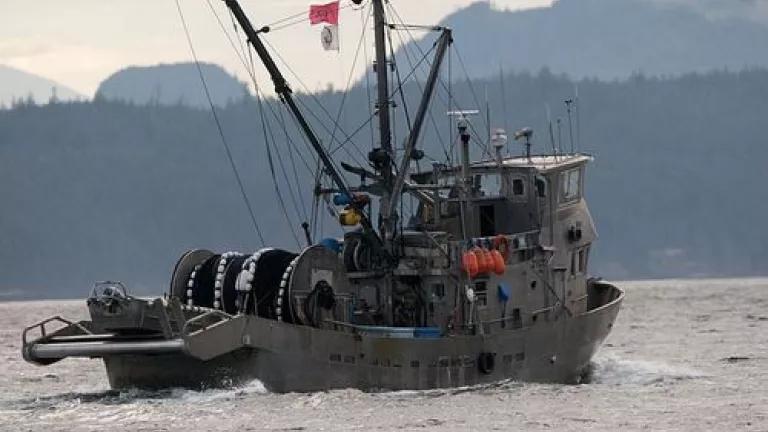This Week in Whales: Why We Love Whales; Dangerous Oil and Gas Exploration Planned Off Coast of South Africa; Humpbacks Are a No Show After British Columbia Sardine Fishery Collapses...

- My colleague Joel Reynolds recently wrote a poignant response to the oft-asked question: why do people care so much about whales? The answer is complicated, and essential to everything I, along with NRDC's entire Marine Mammals team, do every day. Perhaps, as Joel writes, if we save the whales, we can save ourselves. While that may seem a bit too pat (it reminds me of “Save the Cheerleader, Save the World”), there’s no denying that in saving whale populations from extinction, especially as related to climate-change impacts, we’re helping ourselves. So maybe there’s nothing altruistic about it at all; we love whales because we love ourselves.
- I've blogged extensively about the alarming unusual mortality event on the Atlantic seaboard—over 550 dolphins have died in the past three months. On LiveScience, I discuss the mass dolphin strandings in detail, and the human activities that have degraded coastal ecosystems to the point of potentially weakening dolphins' immune systems and rendering them more susceptible to such an epidemic.
- A French oil and gas exploration company is planning to conduct seismic surveys off the coast of South Africa, all day every day for four months next year. The survey vessel's 70 airguns would blast 230 decibel sonic booms day and night, threatening the health of whales, dolphins, sea turtles, and other sea life in the region. As my colleague and I have blogged, underwater ocean noise poses a serious threat to marine mammals, which use echolocation to navigate, feed, forage, mate, and communicate. South Africans are right to be concerned and should demand strict controls over the project. It seems that some protective measures are being considered, such as timing the survey so that it won’t coincide with whale migration and using “soft-start” procedures to ramp up the blasts as a warning for animals to get out of the area. Those measures are a good start, although ramping up is an odd way to solve a problem: “save your selves by abandoning your habitat and normal life functions.” Shouldn’t we be putting the brakes on oil and gas development entirely? I think I’ve heard something about carbon emissions and climate change… Is that ringing a bell with anyone?
- Meanwhile, in Strasburg, Germany, the European Parliament voted to require the preparation of Environmental Impact Assessments for offshore oil and gas surveys. Seems like a no-brainer, right? Hopefully the European Council passes the proposed legislation! Maybe those assessments will note that it’s counterproductive to look for oil and gas that we shouldn’t be burning anyway. Again, has anyone ever heard of climate change?
- A $32-million commercial sardine fishery off the coast of British Columbia has inexplicably collapsed—commercial fishers did not catch a single sardine. Whales, at the top of the food chain, are good indicators of an ecosystem's health, and humpbacks, were conspicuously absent from the British Columbia coastline this past year. Instead, humpbacks “were observed farther offshore, possibly feeding on alternative food sources…but not in the numbers observed near shore in recent years.” According to whale biologist Jim Darling, “Humpbacks are telling us that something has changed. Ocean systems are so complex, it’s really hard to know what it means. For one year, I don’t think there’s any reason to be alarmed, but there is certainly reason to be curious.” Last week, I blogged about the disappearance of the North Atlantic right whale from the Bay of Fundy, perhaps due to low levels of plankton there. Hmm, seems to me that humpbacks and North Atlantic right whales are indeed telling us that “something has changed.” Maybe it has to do with warming oceans—“It is virtually certain that the upper ocean (above 700 m ) has warmed from 1971 to 2010 and likely that it has warmed from the 1870s to 1971”—as noted by the Intergovernmental Panel on Climate Change (emphasis in original). Maybe not. Scientists from Canada, the United States, and Mexico are supposed to meet and discuss.
- Humpback whales are well-known for blowing bubble nets near the ocean surface, but new research suggests they spend quite a bit of their time feeding at the ocean floor. Computer scientists at the University of New Hampshire analyzed data on the whales' whereabouts collected from electronic suction-cup tags that show the whales rolling over, swimming, and feeding along the bottom of the ocean on their side. Footage from Crittercams affixed to a couple humpback whales supports this theory--check out the trippy video here.
- Check out these stunning photos of dolphins exhibiting cooperative behavior here.
- Whales don't spray water out of their blowholes; their exhalations (or "spouts") are mostly air, warmed by the whale's body so it condenses when it hits the cooler air above the water's surface and just looks like water.
Meanwhile, this week in Wales…
Environmentalist group Friends of the Earth Wales is demanding that the Welsh government revoke funding for a controversial £105 million (around $167 million) waste incinerator, citing dangers to the environment and public health. The project indeed warrants a closer look--incineration is an outdated technology that places a disproportionate environmental burden on those living nearby.
Photo Credit: A seine fishing boat, like the ones used to fish for sardines, in British Columbia. Wikimedia Commons.

